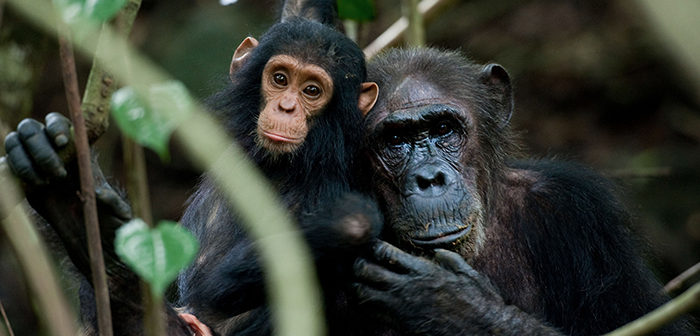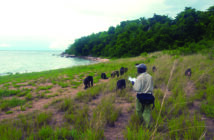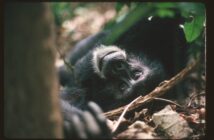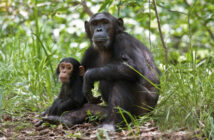We at the Jane Goodall Institute recently saw articles showcasing a video of a juvenile chimpanzee using a cell phone. Unfortunately, and likely not clear to the writers and readers, this is an awful portrayal of a captive live juvenile chimpanzee. We hope the articles and the video will be taken down and that we can as a community commit to better policies around showcasing and caring for captive animals (and wild). We also hope statements/explanations about the decision to remove the articles and the video are made to help improve awareness and understanding of the issue.
I am very disappointed to see the inappropriate portrayal of a juvenile chimpanzee in this video which is currently circulating on social media. Chimpanzees are highly social animals, very intelligent and have complex emotions like humans – it is imperative that we portray them appropriately and that they receive the best possible care in captive environments. Portraying chimpanzees in this way on social media is also perpetuating the illegal pet trade in great apes, and as they cannot be domesticated, interactions with humans as displayed by this video are highly dangerous, as well as harmful to the well-being of the chimpanzee. As responsible and compassionate individuals, I hope anyone who sees the video will not like, share or comment on it and all responsible media outlets change the coverage of the video to highlight stories of chimpanzees in wild or responsible captive care. And I hope and urge the people who have chimpanzees in their care will cease use of him in this way and join those of us who are working to end the cruel treatment of chimpanzees in entertainment. – Dr. Jane Goodall
There are several reasons why the video is highly problematic, and both perpetuates the inappropriate handling of this chimpanzee, and larger threats to great apes (both captive and in the wild) including:
1) This video represents likely a chimpanzee from Myrtle Beach Safari which has used chimpanzees inappropriately in the past. Other videos featuring a chimpanzee named Limbani, show how chimpanzees are continuously inappropriately handled and showcased on social media through other establishments like “Zoological Wildlife Foundation.” This includes questionable displays of their animals across social media and allowing influencers to take Limbani to their homes, or for the public to play with Limbani for money. The ZWF claims to be an accredited ZAA member, but does not appear on their site. This is compounded by influencer Mike Holston “@The Real Tarzann,” who promotes mishandling and inappropriate captive care of Limbani and this video across his significant social media platform. In other videos, Limbani is not with other chimpanzees (as he should be, chimpanzees are extremely social and require a chimpanzee community or at least company), and is often dressed in clothing, interacting with humans, all to promote the brand of this influencer and this establishment. It is unclear why they continue to do this or how it is permitted, but it is certainly harmful to the long term psychological and physical needs of this young chimpanzee.
2) Content like this perpetuates the extremely dangerous idea that chimpanzees make cute “pets”. Despite potentially benign intentions, it is part of the larger issue of social media videos and posts of this kind driving the illegal trade in chimpanzees and other great apes as pets. This is not only causing them great individual suffering as they are often not cared for properly and then abandoned but is also stealing great apes (which are endangered) from the wild. 3,000 great apes are stolen from the wild every year.
- Chimpanzees are extremely intelligent and have complex emotions like humans. For examples of what happens to chimpanzees used in entertainment, bred for “roadside attractions”, or used in facilities in this manner, you can find out more from the Center for Great Apes , which takes them in after they’ve been abandoned or abused – many of them have profound psychological damage and it has taken years to help rehabilitate them. Many of them will carry those scars for the rest of their lives (chimpanzees in captivity live up to 60 years).
- For more examples of how the internet and social media are perpetuating the illegal sale of primates, killing or taking them from the wild, and what many in the conservation and tech community are doing to improve tracking and reporting, read more here and here.
- For an article by the Dodo about this exact issue and facility from 2018, read more here.
3) Content like this perpetuates the idea that chimpanzees are not endangered (look they’re cute and fun!). They are very endangered. If we don’t get people to understand the threats to chimpanzees in the wild and captivity, they could be extinct in our lifetime.
4) It also promotes the idea that humans can handle and kiss chimpanzees and other wildlife. This is very untrue and very dangerous, as humans and chimpanzees are so biologically similar, we can spread disease to one another very easily. Chimpanzees also grow to be larger, stronger and potentially aggressive – putting humans and chimpanzees in danger. We cannot let examples of this lead the public to interact with wildlife/captive animals in this manner – only experts and professionals should be handling chimpanzees.
4) You can learn more about our work in the Republic of the Congo with our Tchimpounga sanctuary to take in rescued orphan chimpanzees and end the illegal wildlife trade in great apes through our ForeverWild #4EverWild campaign. Many of the chimpanzees at Tchimpounga were orphaned as their mothers were shot to take the babies for the illegal pet trade. There are nearly 140 rescued chimps at the facility, and it is only one of many across Africa, evidence of how wide spread this tragic issue is.
5) The behavior demonstrated would not be considered a natural behavior for wild infant chimpanzees. Play and tool use, as Dr. Goodall discovered, is common in chimpanzees – but in the case of chimpanzees in inappropriate captive environments being introduced to behaviors they would not typically demonstrate, there is a large amount of research around how that may cause detrimental long–term effects to the individual animal.
These platforms have very large audiences, and what we represent and share can have wide spread and terrible consequences. We have the choice to be responsible in the way we portray animals (captive and in the wild) and how we promote, or in this case, remove and/or not promote problematic content. If you care about chimpanzees, as many people interacting with this content have suggested they do, you would investigate further to understand the cruelty behind this content and what we can each do to divest from endorsing, liking and sharing content of this kind, for this instance and in the future.
Want to support the care of rescued chimpanzees at Tchimpounga? Learn how here.

The Jane Goodall Institute is a global community conservation organization that advances the vision and work of Dr. Jane Goodall. By protecting chimpanzees and inspiring people to conserve the natural world we all share, we improve the lives of people, animals and the environment. Everything is connected—everyone can make a difference.









